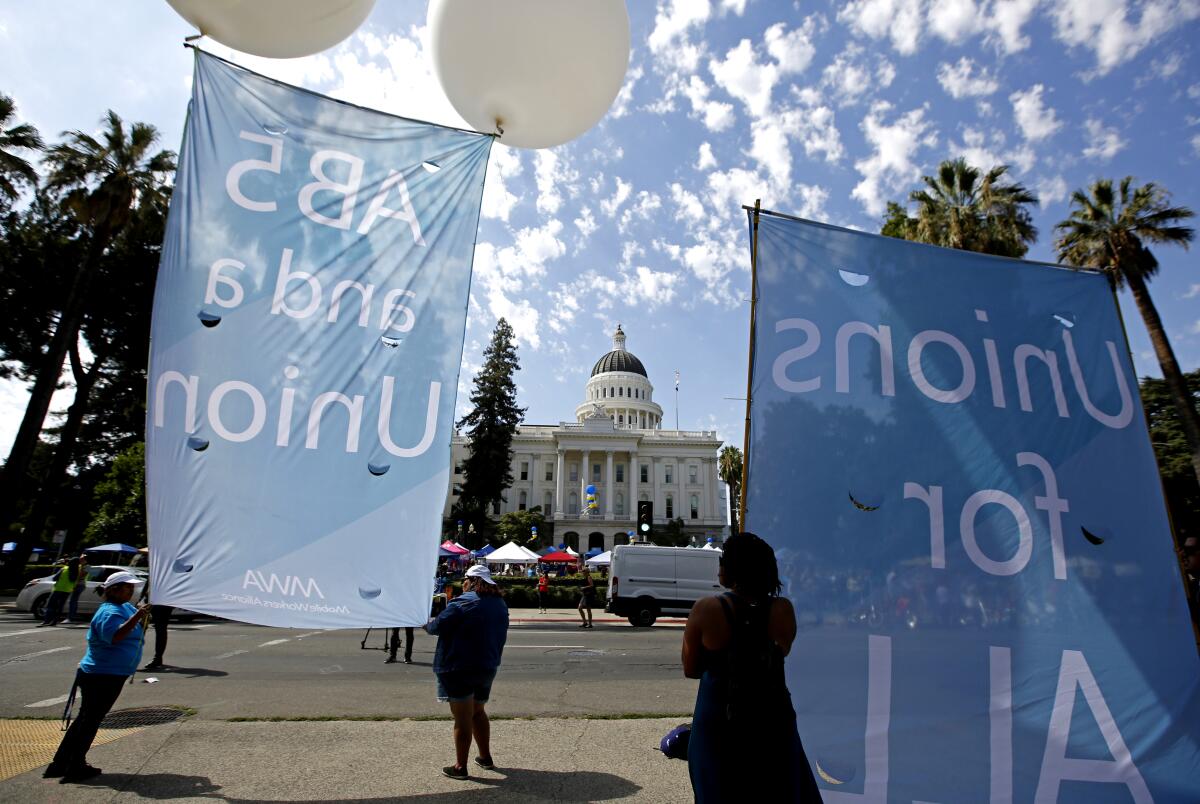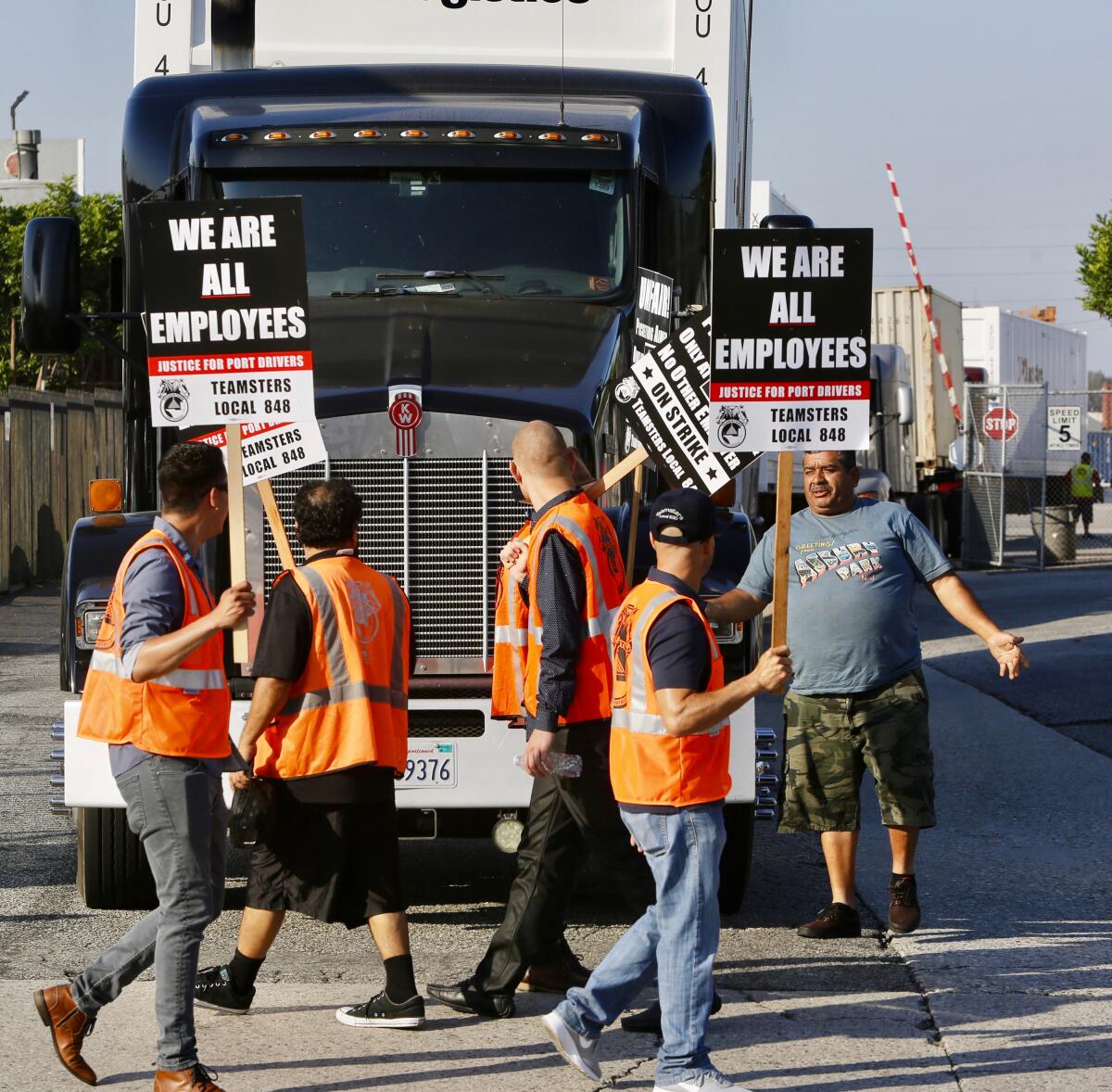A bill giving workplace protection to a million Californians moves one step closer to law

- Share via
A measure to curb the widespread use of independent contractors across the California economy moved closer to final passage in the Legislature on Friday even as Uber, Lyft and other gig economy companies mounted a fierce lobbying campaign to sidestep its reach.
The landmark legislation, which could set a precedent in a national battle to improve pay and benefits for low- and middle-wage workers, would change the employment status of more than a million Californians.
Janitors cleaning downtown office buildings, truckers loading goods at the ports of Los Angeles and Long Beach, construction workers building new homes, manicurists, medical technicians, nightclub strippers and even software coders would be among scores of occupations offered protection against long-documented workplace abuses.
Assembly Bill 5, which writes into law a strict test before companies can classify workers as contractors, cleared a key fiscal committee Friday in the state Senate. It is expected to pass both houses of the Legislature before lawmakers adjourn Sept. 13.
If that happens, Gov. Gavin Newsom is expected to sign the bill. “The governor is supportive of addressing the misclassification of workers, which for decades has been a driver of income inequality,” a Newsom spokesman said.
Hundreds of companies have faced lawsuits and government penalties for treating workers as independent contractors, a decades-long national trend that has impoverished wage earners, weakened labor unions and contributed to what experts call a fissured workplace between haves and have-nots.
Some 400,000 Californians are estimated to work either part-time or full-time for fast-growing platform-based technology companies, offering an array of services such as rides, food deliveries, household repairs and dog-walking.
App-based companies argue they offer a different employment model — innovative and flexible — and should thus be exempted from AB 5. They say that as contractors, their workers can set their own schedules and work for multiple companies. AB 5 could cost the firms millions of dollars, hindering future profitability.
Any such gig company carve-out is unlikely this year, but in an aggressive power play Uber, Lyft and DoorDash threatened Thursday to spend $90 million on a 2020 ballot measure unless the Legislature passes a new bill allowing them to avoid classifying drivers as employees.
The California Labor Federation, representing 1,200 unions with 2.1 million members, vowed to defeat the effort, which, if it materializes, could be one of the most expensive ballot measure campaigns in state history.
Newsom has indicated he may support gig companies’ proposal to create a special employment category for app-based drivers, and his staff has been negotiating the details with Uber and Lyft for months. “There’s been a lot of carve-outs in the [AB 5] legislation, so there has been a framework of compromise,” Newsom told reporters earlier this month.
In a letter, 75 law professors , economists and other academics urged Gov. Gavin Newsom and lawmakers not to exempt gig workers.
In a letter this week, 75 law professors , economists and other academics urged Newsom and lawmakers not to exempt gig workers, writing that “California is poised to lead the country — indeed, to lead the world — with the strongest law on record to protect workers from misclassification.”
Contractors, including many in multibillion-dollar technology companies, are not covered by laws guaranteeing a minimum wage, overtime pay, sick leave, family leave, unemployment and disability insurance, workers’ compensation and protection against discrimination or sexual harassment.
State officials estimate California loses some $7 billion a year in payroll taxes due to misclassification. Nor do companies pay Social Security or Medicare taxes for contractors.

AB 5 is modeled on a sweeping 2018 California Supreme Court decision involving Dynamex Operations West, a national package delivery company that reclassified its employees as independent contractors, forcing them to use their own vehicles and pay for gas and other expenses — similar to the practices of Uber, Lyft, DoorDash, Postmates and Amazon Flex.
The court set a strict new test: Workers must be treated as employees, not independent contractors, if their jobs are central to a company’s core business or if the bosses direct the way the work is done. For instance, a solo plumber with his own company who is hired by a bakery to fix a leak can be an independent contractor. But a plumber working regularly for a plumbing company and sent out on jobs must be an employee.
A tighter standard, the court wrote, should prevent businesses from evading “fundamental responsibilities” and engaging in a “‘race to the bottom’ ... result[ing] in substandard wages and unhealthy conditions for workers.”
By codifying that new test, AB 5 makes it less vulnerable to legal challenge and allows the state, not just the courts, to enforce it.
Over months of furious business lobbying, the bill’s author, Assemblywoman Lorena Gonzalez (D-San Diego), has narrowed its scope with amendments exempting certain occupations, including doctors, lawyers, architects, engineers, accountants, insurance agents, Realtors, hairstylists, freelance journalists and financial brokers.
The exceptions, she said, allow independent contracting “in professions where people have the ability to negotiate for themselves,” and where they own their own businesses in occupations with no documented history of misclassification and wage theft.
On Friday, new amendments addressed the concerns of the trucking industry, which has filed suit in federal court seeking to overturn the Dynamex decision and had deployed caravans of protesting drivers to circle the capital. Owner-operators who work for multiple companies — delivering supplies to construction sites, for instance — could be classified as independent contractors if they meet strict criteria for business ownership.
But the amendments do not exempt the thousands of port truck drivers who work for Southern California transportation companies, which have been repeatedly charged with misclassification and wage theft by state authorities.
“Trucking has some of the worst violators,” Gonzalez said. “We are not going to strip out employee protections.”
Other provisions added Friday included exemptions for dentists, podiatrists, psychologists, travel agents, payment processing agents, photographers, editors and commercial fishermen.
Despite lobbying by the California News Publishers Assn., newspaper carriers, who have been plaintiffs in misclassification lawsuits, were not exempted. (The Los Angeles Times is among the association’s 500 members).
AB 5 was never added to the California Chamber of Commerce’s annual list of “job killer” bills, a designation that often dooms legislation. That is because without a bill, the court decision would remain in force, affecting a far larger swath of companies than AB 5, and inviting more litigation.
“AB 5 is a compromise,” said chamber President and Chief Executive Allan Zaremberg. “It deals adequately with certain professions, but not with a lot of other situations. ... Organized labor likes everyone to be an employee. That’s not necessarily realistic.”
The chamber, he said, is “hopeful for a legislative solution” for companies that deliver customers through an app.
So far, votes on AB 5 have divided largely along partisan lines. Democrats overwhelmingly support the bill and most Republicans oppose it.
Uber and Lyft drivers have mounted public protests against slashed wages, arbitrary terminations, multimillion-dollar executive pay and shareholder windfalls. However, some Democratic lawmakers often aligned with business suggest that AB 5 doesn’t provide enough flexibility to workers.
“We must protect workers from exploitation,” said Sen. Steve Glazer (D-Orinda). “But we should also protect the right of people to be their own boss if that is what they want to do — as long as they set their own hours, charge what they want and control their work product.”
As the Golden State gears up to enforce its landmark legislation, other states are looking at similar reforms. Several Democratic presidential candidates have endorsed AB 5, and similar legislation has been introduced in Congress.
Said Steve Smith, a spokesman for the California Labor Federation, “The nation is watching what California is doing.”
More to Read
Inside the business of entertainment
The Wide Shot brings you news, analysis and insights on everything from streaming wars to production — and what it all means for the future.
You may occasionally receive promotional content from the Los Angeles Times.













